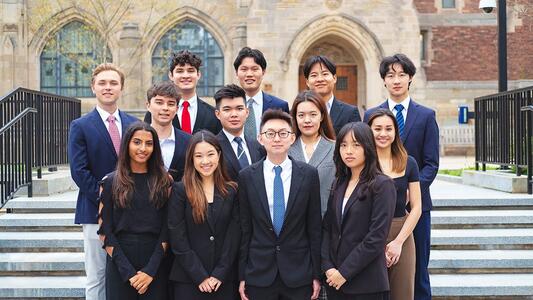
Daphne Klemme, senior administrative assistant in physics interviewed Yale Physics undergraduate student Austin Wang, YC’2026 about his taking a leave of absence from Yale to pursue his startup, Manaflow, which was recently funded $500K by Y Combinator.
Y Combinator (YC) hosts two 3-month programs — one from January through March, and one from July through September with the goal of helping startups really take off. They arrive at YC at all different stages. Some haven’t even started working yet, and others have been launched for a year or more. But whatever stage a startup is at when they arrive, our goal is to help them to be in dramatically better shape 3 months later.
More about YC can be seen on their website, see below.
Tell me a little about yourself and why the startup appealed to you.
 Hi! I’m Austin, a Physics & Computer Science and Economics major at Yale in Berkeley College from Irvine, California. On campus, I led the Yale Undergraduate Consulting Group (YUCG) and YHack as the former President and Executive Director. I was also a violinist in the Yale Symphony Orchestra and took lessons in a faculty studio at the Yale School of Music. My background spans from engineering roles at Google, NASA JPL, Chess.com, Datacy, and Best Western Hotels. I have also been featured on The Economist and Business Insider for my work. Some of my other hobbies include stargazing, swimming, traveling, trying new foods, rooting for the Lakers, and listening to C-pop & Studio Ghibli.
Hi! I’m Austin, a Physics & Computer Science and Economics major at Yale in Berkeley College from Irvine, California. On campus, I led the Yale Undergraduate Consulting Group (YUCG) and YHack as the former President and Executive Director. I was also a violinist in the Yale Symphony Orchestra and took lessons in a faculty studio at the Yale School of Music. My background spans from engineering roles at Google, NASA JPL, Chess.com, Datacy, and Best Western Hotels. I have also been featured on The Economist and Business Insider for my work. Some of my other hobbies include stargazing, swimming, traveling, trying new foods, rooting for the Lakers, and listening to C-pop & Studio Ghibli.
I’ve always been a super curious person at heart. I love learning about all kinds of different fields and subjects, interweaving them into creative, cross-industrial software solutions. In elementary school, I remember being inspired by Steve Jobs’ iPhone keynote presentation, and my 4th grade teacher, who was the first person to introduce me to computer programming. Ever since then, I kept on hacking projects with friends and knew that I wanted to be an entrepreneur – to build a grand vision, take extraordinary risks, and break the status quo. Often, my friends know me as someone who likes to get things done quickly and find ways to make things more efficient, so it’s probably not a big surprise that I’m now building in the workflow automation space.
Please tell me about your startup and how it came about and tell me about the funding you won and about Y Combinator.
We’re building Manaflow to help operation teams build and automate end-to-end technical workflows for their businesses. Manaflow empowers non-technical teams to build, manage, and automate workflows that require analyzing data, building tools, connecting apps, and taking actions in a spreadsheet user interface. Think Excel, but with much more functionality. Using English, you can train Manaflow agents to interface with multiple third-party apps concurrently, host custom-built tools as persistent APIs, sync & build data dashboards, run custom ML models, and execute recurring actions for your business. We’re funded by Y Combinator, which is a startup accelerator founded in 2005 that provides early-stage startups with funding, mentorship, and community. Y Combinator has helped launch successful companies like Airbnb, Dropbox, Doordash, Twitch, Stripe, Coinbase, and Reddit, and YC-funded startups are worth over a combined total of $600 billion.
As the former President of the Yale Undergraduate Consulting Group, I’ve been fortunate to talk with many managers, directors, operators, and executives from Fortune 500 companies, local businesses, nonprofits, and startups, which have allowed me to identify common pain points. To me, the biggest problem was that small-to-mid-sized businesses (SMBs) were not technologically enabled and automated like their big company counterparts, which prevented them from scaling up faster. Employees of many SMBs interface with hundreds of different Excel files on a daily basis and manually execute business workflows, which is time-consuming, error-prone, and outdated. Currently, there is a huge barrier for SMBs, especially for non-technical teams, to build custom automation and internal software tools for their business workflows.
With the advent of Generative AI, my two hometown friends from Southern California and I came together to build Manaflow because we wanted to even out the playing field for these underdog SMBs. We believe that the ideal way to execute workflows is not a human manually operating Excel sheets or manually operating different softwares glued together, but merely clicking a button. Our hypothesis is that AI can “own” end-to-end technical workflows and convert them into features, while humans can oversee them, update them as the business evolves, and tackle higher-level automations. This is one of the most pressing problems in business that has been recently barely enabled with technological evolution, which is why we’re fully committed and heads-down building Manaflow now.